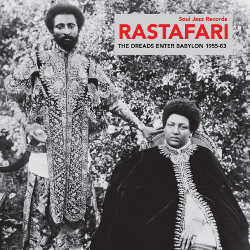Articles about reggae music, reviews, interviews, reports and more...
Rastafari - The Dreads Enter Babylon 1955-83

Rastafari - The Dreads Enter Babylon 1955-83
New compilation charts the links between Rastafari and reggae.
Sampler
Rastafari – a religion or maybe more a way of living – emerged in Jamaica in the 30s, a time of political and social change. But the pivotal catalyst for the Rastafari movement was the crowning of a black king in 1930 – Haile Selassie I or Ras Tafari. Followers of the movement see him as Jah, an incarnation of God.
 A new compilation from Soul Jazz Records charts the many links between reggae and Rastafari. The album, which carry a hefty 20 tracks, spans nearly 30 years of revolutionary and exceptional music influenced by mento, jazz, nyabinghi drumming, anti-colonialism, equal rights and worldwide love.
A new compilation from Soul Jazz Records charts the many links between reggae and Rastafari. The album, which carry a hefty 20 tracks, spans nearly 30 years of revolutionary and exceptional music influenced by mento, jazz, nyabinghi drumming, anti-colonialism, equal rights and worldwide love.
Rastafari – The Dreads Enter Babylon 1955-83 is an in-depth look at reggae and Rastafari and includes righteous and conscious cuts from the likes of Counts Ossie, Johnny Clarke, Ras Michael, Rod Taylor and Mutabaruka.
According to the a press release from Soul Jazz, one of the earliest mentions of Ethiopia in Jamaican music can be found on mento singer Lord Lebby & The Jamaican Calypsonians’ 1955 recording Ethiopia (included on the set), a cut where they sing about Ethiopianism, the political movement that calls for a return to Africa for black people.
But it was in the 1960s that Rastafarian music started to grow, particularly thanks to Count Ossie and his drummers. The visit of Haile Selassie to Kingston in 1966 was of course also instrumental and in the following decade Rastafarian reggae went global with Bob Marley, Bunny Wailer, Peter Tosh, Burning Spear and a host of more underground artists and musicians. Rastafarianism was now synonymous with reggae. It was spiritual with a political and cultural context.
But most of the cuts on this set are not for the faint-hearted. Crowd-pleasers are few and far between. Several of the songs are percussion-driven instrumentals or instrumentals heavily influenced by avant-garde jazz. A bunch of the tracks also includes chanting rather than singing.
This compilation is however a solid overview of a groundbreaking genre that became a rebel sound.
Read more about this topic
Comments actually desactivated due to too much spams
Browse by categories
Recommended Articles
Latest articles
Recently addedView all
© 2007-2026 United Reggae. All Rights Reserved. Reproduction in whole or in part is prohibited. Read about copyright
Terms of use | About us | Contact us | Authors | Newsletter | A-Z














